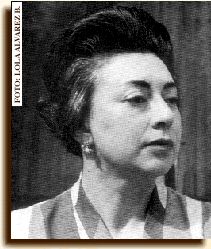

Nació en la Ciudad de México en 1925, murió en Tel Aviv en 1974. Aunque practicó con acierto todos los géneros literarios, la plenitud de Rosario Castellanos está en su obra poética que registra varias etapas, al fin complementarias más que opuestas. La conciencia del mestizaje, la perduración en nuestro ser de una raza vencida a la que el mundo fue sin misericordia arrebatado, dan forma y profundidad a muchos de sus versos. Otra de sus constantes preocupaciones expresivas ha sido el desamparo que sucede a la pérdida del amor. La objetividad, un "realismo" encendido por la potencia lírica de la palabra, prevalece en los poemas que sueltan la voz para afirmar la urgencia solidaria de la comunidad. El mundo de referencias personales se ensancha para abarcar las furias y las penas de los demás. Así, el pensamiento se vierte sin fisura en una forma cuya excelencia artística es complemento activo del significado.*
Toda su producción poética fue recopilada en el libro Poesía no eres tú (1972).
Las versiones en inglés aquí publicadas se tomaron de la antología poética publicada en inglés por Julian Palley, Meditation on the threshold: a bilingual anthology of poetry (Tempe, Ariz.: Bilingual Press/Editorial Bilingue, 1988). La traducción italiana que aquí se presenta proviene de Rojo de vida, negro de muerte, Carlo Coccioli (ed.), traducción de Carlo Coccioli y Tullio Ristori, Jester Libri, Bologna, 1969. La traducción francesa es de Claude Major y es la primera traducción de estos poemas de que tengamos conocimiento.
Born in Mexico City in 1925, Rosario Castellanos spent much of her childhood in Comitán, in Mayan southern Mexico. After traveling to Europe and to the United States for advanced study in aesthetics, she returned to the province of Chiapas to work with Indian theater groups and the Indigenous Institute of San Cristóbal. Much of her work, even throughout her involvement with the literary group "The Generation of the '50s," tried to traverse the distance between the pre-Columbian and the European cultural traditions of Mexico. This social division was complicated, for Castellanos, by her awareness of the alienated and disempowered situation of women in both traditions. Castellanos’ friend Elena Poniatowska characterized this complex position in personal terms: "Rosario was always alone, Her childhood was lonely, her adolescence desperately so, and as an adult she lived under the sign not just of loneliness but of singleness. Solitude becomes the thread that sews the pages of her books, linking poetry and prose and running from her novel Balún Canán (1957)… to the poems collected in Poesía no eres tú (You are not Poetry, 1972)." José Emilio Pacheco describes the effect of this alienation on her work: "At that time, no one in this country was so clearly aware of her double status, as a woman and as a Mexican, nor did anyone else make of this awareness the very material of her writing, the central thread of her work."
The evolution of Rosario Castellanos' poems tracks a long sequence of excision, clarification, and self-denial. In the effort to tell an undisguised truth, Castellanos moves from an early poetic style rich in imagery and dislocations toward a style of direct statement, simple diction, and occasionally mordant humor. According to Castellanos, her poetic vision was determined in large part by the Mexican Indian’s mystical understanding of the interconnectedness of all life; further, the influence of Gabriela Mistral is sometimes clear in her later poems. Castellanos also wrote formative literary essays, ficiton, and a ground-breaking feminist play, the giddy farce El eterno femenino (The Eternal Feminine, 1975). While serving as Mexican ambassador to Israel, Castellanos died in a freak household accident in Tel Aviv. In an irony she might have enjoyed, she was buried in the rotunda of Illustrious Men, in Mexico City.*
The English translations here presented come from Meditation on the threshold: a bilingual anthology of poetry, edited by Julian Palley, (Tempe, Arizona: Bilingual Press/Editorial Bilingue, 1988).
Né à Mexico en 1925, Rosario Castellanos est mort à Tel-Aviv en 1974. Bien qu'elle ait pratiqué avec succès tous les genres littéraires, c'est dans la poésie qu'elle atteint sa plénitude. La conscience du métissage, la permanence dans l'être mexicain d'une race vaincue à qui on a arraché le monde sans miséricorde, donnent forme et profondeur à nombre de ses vers. La détresse qui succède à la perte de l'amour a été une autre de ses préoccupations. L'objectivité, un "réalisme" enflammé par la puissance lyrique des mots l'emportent dans les poèmes qui donnent la voix pour affirmer l'urgence solidaire de la communauté. Le monde des références personnelles s'amplifie des fureurs et des peines d'autrui. Ainsi, la pensée se déverse sans fissure en une forme dont l'excellence artistique est le complément actif de la signification.*
Toute l'oeuvre poétique de Castellanos a été rassemblée dans Poesía no eres tú (Poésie, ce n'est pas toi), publié en 1972.
Links a páginas sobre Rosario Castellanos